朗文少儿英语Welcome to English 2B Unit6知识点归纳
朗文新派少儿英语巩固级第6单元知识点

Woபைடு நூலகம்ds
四会词:形容词:sour sweet bitter hot salty delicious great
感官动词:look sound smell taste feel动词:sense see hear smell taste feel
Grammar
is—was are—were go—went see—saw laugh—laughed do—did touch—touched say—said can—could come—came look—looked have—had sing—sang make—made sound—sounded cry—cried
第1次课Unit 6 The Five Senses (五种感官)(1)
Words
四会词:Actions:sense感觉,感官see看见hear听到smell闻taste尝feel感觉
Body Parts:eyes眼睛ears耳朵nose鼻子tongue舌头fingers手指形容词:good好的/nice美好的—bad坏的happy—sad loud大声的—low低沉的hard硬的—soft软的三会词:onion洋葱bunny小兔candy糖果cactus仙人掌drum鼓lemon柠檬popcorn爆米花clown小丑
1.背诵本单元的四会词以及给出的所有动词的过去式(查找作业单)
2.用一般过去时的三种结构分别造5个句子。
规则的动词变化规则:1。规则动词词尾直接加ed. walk---walked start—started close-closed.2.以辅音加y结尾的动词,要把y变成i,再加ed,ed发[ d ],如cry/cried study—studied. 3.一些以元音加Y结尾的动词,直接加ed.如:enjoy—enjoyed play—played.特殊变化:把y变i加d如:say---said pay—paid lay—laid4.以nd或ld结尾的动词,将结尾的d变成t.如:send—sent spend—spent lend—lent build---built注意其发音:ed在清辅音后发[ t ].如: laugh/laughed, touch/touched, look/looked ed在浊辅音后发[ d].如: play/ played , close/ closeded在[ t ],[ d ]后发[ id ].如: start/started, sound/sounded
朗文 welcome to English 1B chapter6教案
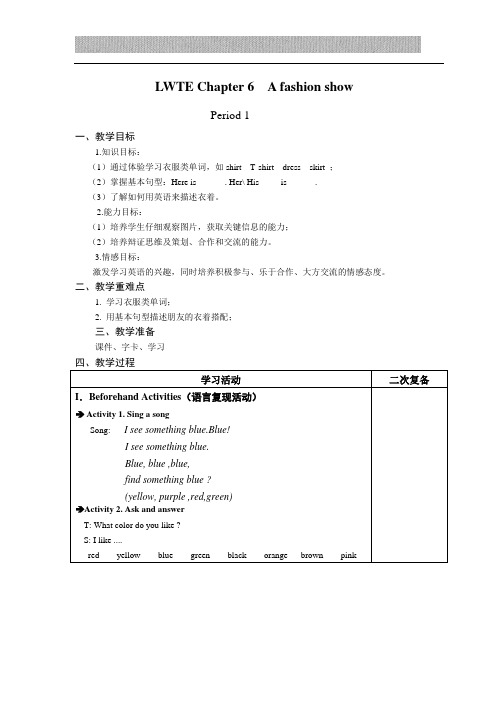
LWTE Chapter 6 A fashion showPeriod 1一、教学目标1.知识目标:(1)通过体验学习衣服类单词,如shirt T-shirt dress skirt ;(2)掌握基本句型:Here is ______. Her\ His ____ is ______.(3)了解如何用英语来描述衣着。
2.能力目标:(1)培养学生仔细观察图片,获取关键信息的能力;(2)培养辩证思维及策划、合作和交流的能力。
3.情感目标:激发学习英语的兴趣,同时培养积极参与、乐于合作、大方交流的情感态度。
二、教学重难点1. 学习衣服类单词;2. 用基本句型描述朋友的衣着搭配;三、教学准备课件、字卡、学习Activity 2. Special clothes for girlsI have many dresses. Can you guess: What color is the best ?I like the purple dress best. But my sister doesn’t like it.shirt skirt T-shirt dress →Activity 4. Try to catch the pictures →Activity 5. Try to readshirt skirt T-shirt dress →Activity 6. Listen and numberskirt dress ( ) ( Sam Mary画一画,自己喜欢的衣服并说一说。
Chapter 6 Period 1 A fashion showshirt T-shirtskirt dress 六、教学反思LWTE Chapter 6 A fashion showPeriod 2一、教学目标1.知识目标:(1)通过体验学习衣服类单词,如 cap hat trousers jeans shorts ;(2)掌握基本句型:Here is ______. Her\ His ____ is ______. Her\ His ____ are ______. (3)了解如何用英语来描述衣着。
unit6welcome 知识点
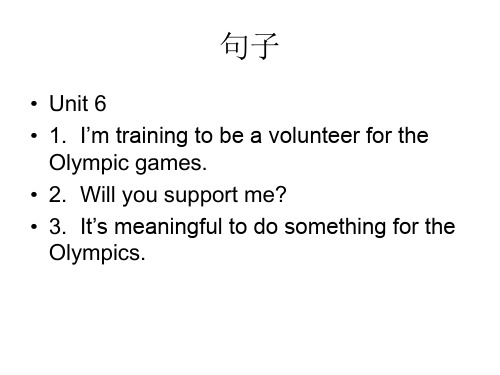
• • • •
Provide sb with sth 为某人提供某物 Provide sth for sb He provide the poor with money He provide money for the poor.
• the adj 某一类人 • the poor/ rich/elderly/homeless/deaf/disabled(people) • We should try our best to help the disabled.
句子
• Unit 6 • 1. I’m training to be a volunteer for the Olympic games. • 2. Will you support me? • 3. It’s meaningful to do something for the Olympics.
helpful/helpless useful/useless meaningful/meaningless careful/careless
• support vt 支持 support sb (with sth) • He often support the homeless with much money • support n(u)不可数名词 支持,拥护 • He gave me much support • supporter n 支持者, • He has many supporters.
• 知识点 train vi(不及物动词) • He often helps me train • He is training on the playground • He is training as a doctor • He is training for the sports meeting • train vt(及物动词) • He is training his dog • train n(名词) • He goes to Beijing by train
朗文新派少儿英语2A基础级第6单元知识点资料
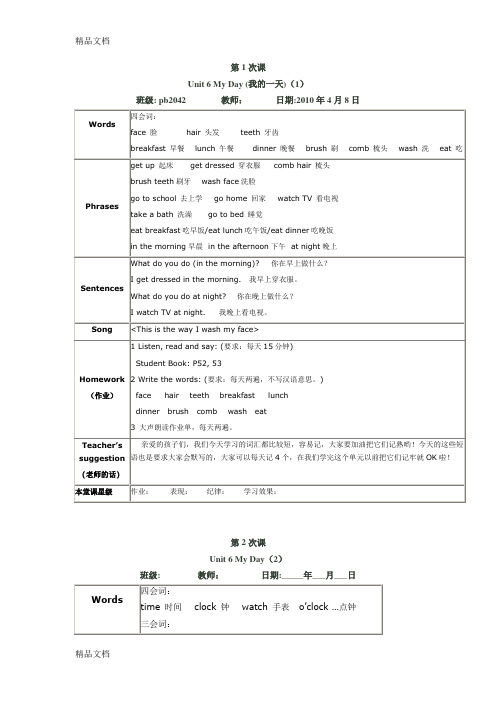
Unit 6 My Day (我的一天)(1)
班级: pb2042教师:日期:2010年4月8日
Words
四会词:
face脸hair头发teeth牙齿
breakfast早餐lunch午餐dinner晚餐brush刷comb梳头wash洗eat吃
Phrases
get up起床get dressed穿衣服comb hair梳头
timeclockwatcho’clock
3 Work Book: P43, 44, 45
4大声朗读作业单,每天两遍。
Teacher’s suggestion
(老师的话)
亲爱的孩子们,我们今天的重点是动词的第三人称单数。回去以后继续多读多记我们上次课所学的短语。在读的时候,每个短语读两遍,第一遍读原型,第二遍变成三单来读!
3大声朗读作业单,每天两遍。
Teacher’s suggestion
(老师的话)
亲爱的孩子们,我们今天学习的词汇都比较短,容易记,大家要加油把它们记熟哟!今天的这些短语也是要求大家会默写的,大家可以每天记4个,在我们学完这个单元以前把它们记牢就OK啦!
本堂课星级
作业:表现:纪律:学习效果:
第2次课
Unit 6 My Day(2)
his他的her她的its它的
人称代词(复)
we我们
you你们
they他们/她们/它们
物主代词(复)
our我们的
your你们的
their他/她/它们的
Homework
(作业)
1 Listen, read and say: (要求:每天15分钟)
Grammar
人称代词与物主代的对应关系:
朗文新派少儿英语入门级第6单元知识点
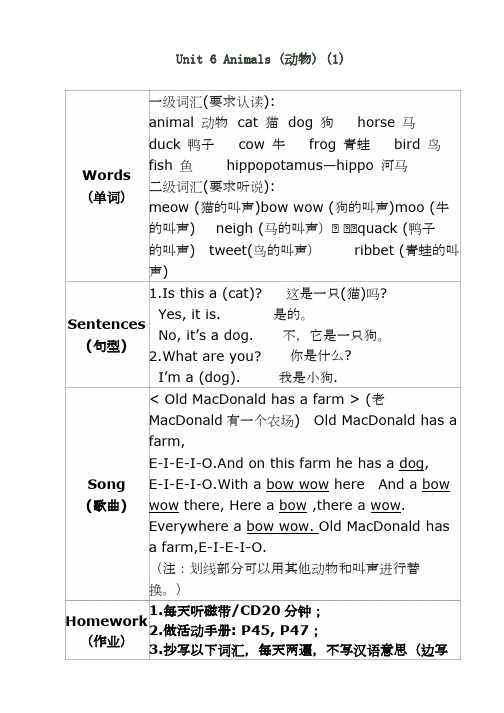
Unit 6 Animals (动物)(1)一级词汇(要求认读):animal 动物cat 猫dog 狗horse 马duck 鸭子cow 牛frog 青蛙bird 鸟fish 鱼hippopotamus—hippo 河马Words二级词汇(要求听说):(单词)meow (猫的叫声)bow wow (狗的叫声)moo (牛的叫声) neigh (马的叫声) quack (鸭子的叫声) tweet(鸟的叫声)声)ribbet (青蛙的叫1.Is this a (cat)? Yes, it is.这是一只(猫)吗?是的。
SentencesNo, it’s a dog.2.What are you?I’m a (dog).不,它是一只狗。
你是什么?(句型)我是小狗.< Old MacDonald has a farm > (老MacDonald 有一个农场) Old MacDonald has afarm,E-I-E-I-O.And on this farm he has a dog, Song E-I-E-I-O.With a bow wow here And a bow (歌曲) wow there, Here a bow ,there a wow.Everywhere a bow wow. Old MacDonald hasa farm,E-I-E-I-O.(注:划线部分可以用其他动物和叫声进行替换。
)1.每天听磁带/CD20 分钟;Homework2.做活动手册: P45, P47;3.抄写以下词汇,每天两遍,不写汉语意思(边写(作业)边读). animal catdog horse cow frog duck fishbird hippo Unit 6 Animals (2)一级词汇(要求认读):worm 虫子bug 臭虫 pig 猪 rabbit 兔子Words eating 正在吃sleeping 正在睡觉jumping 正在跳swimming 正在游(单词) walking 正在走running 正在跑泳crawling 正在爬flying 正在飞1. What is the (cat) doing? (猫)正在做什么?It’s (sleeping).它正在(睡觉)。
(2021年整理)深圳朗文小学英语知识点1-7册
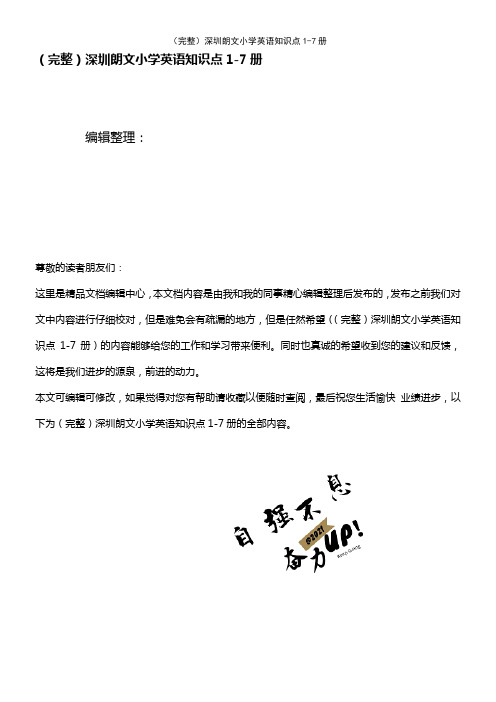
(完整)深圳朗文小学英语知识点1-7册编辑整理:尊敬的读者朋友们:这里是精品文档编辑中心,本文档内容是由我和我的同事精心编辑整理后发布的,发布之前我们对文中内容进行仔细校对,但是难免会有疏漏的地方,但是任然希望((完整)深圳朗文小学英语知识点1-7册)的内容能够给您的工作和学习带来便利。
同时也真诚的希望收到您的建议和反馈,这将是我们进步的源泉,前进的动力。
本文可编辑可修改,如果觉得对您有帮助请收藏以便随时查阅,最后祝您生活愉快业绩进步,以下为(完整)深圳朗文小学英语知识点1-7册的全部内容。
小学英语第一册Unit 1 saying helloHello!Good morning .How are you ! -—-—Fine, thank you 。
Goodbye.Thank you。
Unit 2 Making friendsGood afternoon 。
Hello!I’m Pat. ————Hi! My name’s Bill。
What's your name ? --—-xxxUnit 3 My classroomWhat's this?—-——It’s a chair/fan/computer/desk/book/girl/king/queen.What's this in my classroom ?————It's xxx。
Sorry。
Unit 4 My school thingsWhat’s this ? It’s my .。
.This is my bag/ruler/rubber/pen/pencil/pencil case.Unit 5 RevisionUnit 6 playing a gamePoint to the board.Look at the window。
Sit down。
Open your books。
Close your books.Stand up.You're out.Unit 7 My bodyears eyes a nose/mouth fingerDraw 。
朗文新派少儿英语巩固级第6单元知识点
sounded ---- sound的过去式
looked ---- look的过去式
Sentences
1.Yesterday we went to the (park).
2.The weather was (rainy).
3.We were (sad).
Homework
5. The lamb feels soft.这个羊羔摸起来感觉很柔软。
Homework
1 Listen, read and say: (要求:每天15分钟). Student Book: P53-4,P56-8;
2抄写四会词,每天两遍,不写汉语意思;
3 WB:P44-3,P50-1
Unit 6 The Five Senses(3)
1.look看起来,sound听起来,taste尝起来,smell闻起来,feel感觉起来,等等),可以当系动词使用,后面加形容词。例如:It tastes sour.它尝起来很酸。/ They look happy.他们看起来很开心。
2.一般过去时:表示过去存在的状态或发生的动作。
①主-系-表”结构常表示过去存在的状态. Be的一般过去was, were。疑问要把Was, Were放句首,not否定放在was, were之后(was not= wasn’t ; were not= weren’t)I was a teacher. They were happy yesterday.
2.以辅音加y结尾的动词,要把y变成i,再加ed,ed发[ d ],
如cry/cried study—studied.
3.一些以元音加Y结尾的动词,直接加ed.如:enjoy—enjoyed play—played.
Longman welcome to English香港朗文1A-6B单词
5 / 48
Longman welcome to English—Vocabulary Book
kangaroo lion many monkey nineteen panda penguin seventeen sixteen sky snake some tail there thirteen tree twelve twenty van vet wing zebra Chapter 4
hand(n.) head knee leg long mouth nose rude short thin toe
手 头 膝盖 腿 长的 嘴 鼻子 粗鲁的 矮的 瘦的 脚趾 双胞胎 谁 肩膀 演出,节目 小的 高的 那,那个
所有的 不是 手臂,胳膊 (介词)在 卷曲的 耳朵 眼睛 肥胖的 脚(复数) 脚 眼镜 头发
另一个 能 爬 画(画) 英语 快速地 找到 尝试,成功 帮助 跳 风筝 国王 晚的,迟的 错过
orange(adj.) 橙色 pen pencil pencil case pink play red right ruler 钢笔 铅笔 铅笔袋 粉色 玩 红色 正确的 尺,直尺
3 / 48
Longman welcome to English—Vocabulary Book
袋鼠 狮子 许多的 猴子 十九 熊猫 企鹅 十七 十六 天空 蛇 一些 尾巴 那里 十三 树 十二 二十 小型货车 兽医 翅膀 斑马
爱 我 遇见,相逢 母亲 令人愉快的 她 姐妹 (介词)到 也 和……一起
have it little nine one only pig robot see seven six
有 它 小的 九 一 只有,仅仅 猪 机器人 看见 七 六 玩具熊 十 三 二 是,是的
朗文少儿英语Welcome to English 2B 句型汇总
Unit6 Places in the Park 问:你星期几的时候做什么? 答:我… What do you do on …? I…
复习:星期表达法
Unit 5 Sports We Like 问:你喜欢做什么? 答:我喜欢…。 What do you like doing? I like ... (动词+ing) (playing football/basketball/volleyball/badminton)
2
Unit 2 Our Favourite Food 问:这里有一些…吗? 答:是的,这里有…/不,这里没有… Is there any…? Are there any…? Yes, there is. No, there isn’t. Yes, there are. No, there aren’t.
Unit 3 My Day ① 问:现在几点了? 答:现在…点。 What is the time? It’s… 是时候做某事了。 It’s time to…
1
2017/08
Longman English Book 2B 句型整理
by Cathy
Uห้องสมุดไป่ตู้it 4 Helping at Home 问:…会帮家里做什么家务呢? 答:…会帮忙做… How do … help at home? … (wash the dishes/set the table/water the plants)
2017/08
Longman English Book 2B 句型整理
by Cathy
Unit1 Buying Snacks ① 问:你喜欢什么? 答:我喜欢… What do you like? I like… ② 问:你喜欢…吗? 答:是的,我喜欢。/不,我不喜欢。 Do you like…? Yes, I do. / No, she don’t. ③ 问:她/他/它喜欢…吗? 答:是的,她/他/它喜欢/不,她/他/它不喜欢 Does she like…? Yes, she does. / No, she doesn’t.
LongmanwelcometoEnglish各册教学内容安排
用
中西方节日名称
一般过去时的一般疑问
了解各个节日对应的活动
句
字母组合 gh 的发音
What / Where / How
many 的用法
介词 at on in 的区别
与用法
香港朗文小学英语 4A 教材教学内容
学习内容
语法知识
向朋友作自我介绍的基本信息 各类特殊疑问词的不同
第8页
(姓名、 、住址、爱好、生
定回答 Do you like.../ Would
you like...的用法 and / or 的用法
第五单元
不同商店的名称
Is there 引导的一般疑问句
商场文化以及楼层表达的文化
以及回答
差异
序数词
字母组合 ea / ee 的发音
第六单元 常见的公共、购物、娱乐等场所
更多的方位介词
名称
询问与指明方向
选择疑问句
学会礼貌的选择食物及表达食 What / Which 的用法
物的口味
第五单元 表示人物性格特征的形容词 形容词的最高级变化规
对身边人的性格特征进行描述
则及运用
第六单元 业余时间里开展的活动名称 形容词不规则的比较级
表达各种活动开展的频率
变化
频度副词
第七单元 一些表示日常生活行为的动词 when 引导的时间状语从
用法
日、e-mail 等)
关于住址的表达与信封
写法的中西方文化差异
第二单元 同学朋友之间外貌特征、性格爱 形容词的规则比较级变
好的对比
化及运用
相同点与不同点的比较
第三单元
一些常见食品的名称
不可数名词的数量表达
对食物的口味、价格、受欢迎程 多音节形容词的比较级
